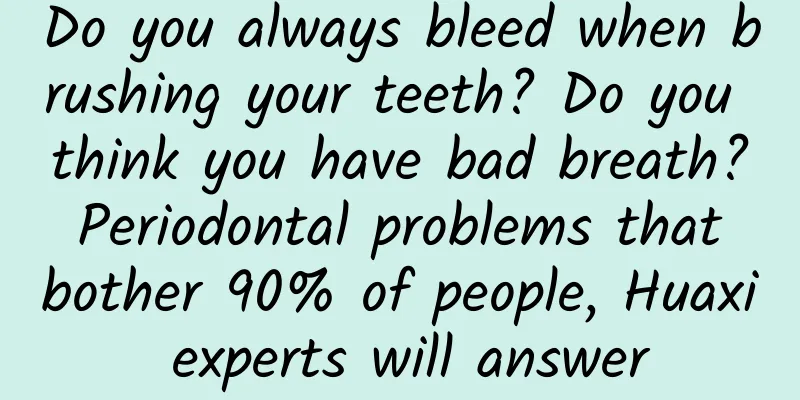Do you always bleed when brushing your teeth? Do you think you have bad breath? Periodontal problems that bother 90% of people, Huaxi experts will answer

|
They say toothache is not a disease, but it can be life-threatening In fact, oral problems are never just "pain" If you don't pay attention when brushing your teeth, you will have a mouthful of blood. After eating for only a few bites, I have to find something to pick my teeth ...... Oral problems such as These may be warning signs of periodontal disease. According to statistics from relevant departments, two-thirds of people in China suffer from periodontal disease, which is the main cause of tooth loss in people over 35 years old. The World Health Organization has ranked the incidence of periodontal disease third after tumors and cardiovascular and cerebrovascular diseases, and it is called the "cold killer" of human health. Don't be scared and meow first What are the symptoms of periodontal disease? West China Hospital of Stomatology, Sichuan University Doctor Wang Jun answers questions online See if you have similar oral problems. ▽ 01 ask I don't feel uncomfortable usually, but it bleeds when I brush my teeth, but it goes away after I rinse my mouth. I'm only 20 years old, so I shouldn't have periodontal disease, right? answer Your courage is admirable, but please remember to look at your teeth!! Because bleeding when brushing your teeth is a signal that your gums are already in an unhealthy state of inflammation: Generally, dental plaque causes gum inflammation, local blood vessels dilate and become congested, and when stimulated by external forces, such as flossing or brushing, they may rupture and bleed. First of all, you should master the correct method of brushing your teeth to remove dental plaque. If the problem of bleeding gums persists and does not improve, it means that there is a problem with your dental health, so you should go to the hospital for a check-up. 02 ask When I was young, my teeth were very straight and I didn't get anything stuck when I ate. But as I got older, gaps appeared between my teeth and food got stuck when I ate. Is this the case with aging? Or is there another reason? answer The problem of wider gaps between teeth is mostly caused by periodontitis! One of the reasons is that periodontitis can cause the absorption of our alveolar bone. The alveolar bone is to teeth as soil is to trees. When the alveolar bone is absorbed, the roots of the teeth become unstable and they will naturally tilt and the gaps between teeth will become larger. The second reason is that periodontitis causes the gums between the teeth to recede, which is the "black triangle" phenomenon. For example, if the oral cavity is not cleaned properly, food residues, plaque and soft deposits will remain between the gums, calcify to form tartar, and occupy the space where the gums originally existed. The gums will become inflamed and gradually shrink. If the inflammation gradually develops, it will lead to the absorption of alveolar bone, the decrease in height, and the formation of gaps between teeth. 03 ask Someone around me told me that he had no gaps between his teeth, but after having his teeth cleaned, the gaps between his teeth became bigger. This made me afraid to go again. Does teeth cleaning really have such a side effect? answer First of all, teeth cleaning will not cause the gaps between teeth to become wider. Patients with periodontitis usually have swollen gums, and the swollen gums and dental plaque basically fill the gaps between teeth. After teeth cleaning, the swelling goes down and the gums become smaller. In addition, the areas where tartar was deposited become empty, so you will naturally feel that the gaps between teeth have become larger. These gaps between teeth are caused by disease. However, the disease will continue to progress if you do not clean your teeth, so you should still clean your teeth regularly. If the gaps between your teeth become larger, clean them properly to prevent the inflammation from continuing to develop. 04 ask I'm asking this question on behalf of my mother. She is 70 years old and has lost several teeth. She says "losing teeth with aging is a natural law" and refuses to go to the hospital. How should I explain this to her? answer This is a misunderstanding of many patients! Whether or not you lose your teeth has little to do with age. It is mainly a matter of oral health. Some people maintain good oral health and still have good teeth when they are old, and they enjoy everything they eat. The main reason for loose or falling teeth in most elderly people is periodontal disease, which is one of the main causes of tooth loss in adults in my country, and the trend is getting younger and younger. The World Health Organization's "8020 Plan" says: As long as oral health is maintained properly, an 80-year-old can still have 20 functioning teeth! So quickly tell your aunt what the Huaxi doctor said and go to the hospital! 05 ask I have a friend, really my friend, who always has bad breath. We remind him but he still doesn't notice it. He can't even stand straight when he is setting up the dragon gate formation. What should I do? answer Just thinking about it makes me feel "socially dead"... In fact, there are many reasons for bad breath, such as liking to eat "heavy-tasting" food, oral diseases, respiratory diseases such as rhinitis, poor gastrointestinal function, endocrine problems, etc., all of which may cause bad breath. However, bad breath caused by oral diseases is relatively easy to diagnose and solve. For the sake of his overall health, he should see a doctor as early as possible, at least to rule out oral problems first! 06 ask So many people are using them, do electric toothbrushes really clean better than ordinary toothbrushes? answer It is true that many people use electric toothbrushes, but studies have shown that if you follow the Bass brushing method, there is not much difference in the cleaning effect between an ordinary toothbrush and an electric toothbrush. Electric toothbrushes may be more efficient and convenient, but it is important to place the brush head at the correct angle and force to achieve good results! 07 ask I am a long-term periodontitis patient and I go for teeth cleaning regularly. However, due to the large gaps between my teeth, food still gets stuck. I use a toothpick to poke out food debris, but I heard that using a toothpick is not good. Is this true? answer This old patient with periodontitis is still using toothpicks. He does not have a full understanding of oral hygiene. I severely criticize him! The correct way of brushing teeth can clean the surface of teeth, but cleaning the adjacent surfaces of teeth requires some auxiliary tools. Toothpicks are hard and cannot be bent, so they cannot clean some tricky places. If you are not careful, you may hurt your gums and cause gum atrophy. Recommended tools for cleaning teeth: Dental floss: Dental floss can penetrate deep into the gaps between teeth and reach hidden places that toothbrushes cannot reach, thereby effectively cleaning food residues, dental plaque, dental plaque, etc. between teeth; and the material is softer and safer; Interdental brush: If periodontal disease causes the gaps between teeth to widen, or if physiological gum atrophy in the elderly causes the gaps between teeth to widen, it is the best time to use an interdental brush. The bristles of interdental brushes are also relatively soft, and you can choose different models and specifications according to the size of your own interdental gaps. The brush head is embedded with iron wire, which can be bent into various angles, making it easier to insert into the interdental gaps for cleaning (I-shaped brushes are suitable for front teeth, and L-shaped brushes are suitable for back teeth); Water flosser: An effective supplement to teeth cleaning. It is convenient for cleaning unevenly aligned teeth, the sides of braces, and the gaps between gums and teeth. Gained a new understanding of periodontal problems and cleaning tools Do your teeth feel stronger? Finally, West China Stomatological Doctor I also want to clarify some misunderstandings about periodontal disease. ▽ Misconception ① Bleeding gums are caused by inflammation Just take more vitamins or anti-inflammatory drugs Bleeding gums are an early symptom of periodontal disease. If this happens, you need to seek medical treatment in time. Vitamins or anti-inflammatory drugs cannot solve the culprits that cause gum inflammation: dental plaque and tartar. Misconception ② As long as you brush your teeth, you won't get periodontal disease The wrong brushing method cannot effectively remove dental plaque in the mouth, and there is a possibility of periodontal disease over time. Misconception 3 If you have periodontitis Just wash your teeth Periodontitis is a disease that requires lifelong maintenance. The treatment methods vary depending on the severity of the disease, including supragingival cleaning (conventional teeth cleaning), subgingival scaling (deep teeth cleaning), and even surgical treatment. And after the periodontitis condition stabilizes, you should follow the doctor's advice and have regular follow-up visits to try to slow down or even stop the progression of the disease. Of course, for healthy people, periodontitis can also be prevented through correct brushing methods, regular oral examinations and cleaning (scaling). Develop good oral hygiene habits, brush your teeth in the morning and evening, rinse your mouth after meals, use dental floss or interdental brushes to clean adjacent surfaces, and wash your teeth at least once every six months to a year. This will effectively remove plaque in the mouth and greatly reduce the risk of periodontitis! Among the ten thousand health tips, oral health is the first Take good care of your teeth and check them regularly, and you will enjoy eating spicy, sour and sweet food. If you find this article helpful, please share it ! If you have any questions about periodontal disease, please leave a comment! |
<<: Eezeer: Airline Twitter Report January 2012
>>: Retinal hemorrhage after exercise, why does aerobics still "strain your eyes"?
Recommend
What causes lower abdominal pain during sex?
Sexual life is an indispensable thing in adult li...
What does anechoic cervical cyst mean?
I believe that women should be very familiar with...
Sometimes breast tenderness
Why do I feel breast pain sometimes? If breast pa...
How to regulate high levels of male hormones in women
Nowadays, many female friends have high levels of...
Can I do aerobics three months after giving birth?
Can I do aerobics three months after giving birth...
Brown slag after drug abortion
In the medical field, it is generally believed th...
Why is the leucorrhea green and has an odor?
When a woman's leucorrhea is green and has an...
Bleeding after menstruation
If there is still blood after the menstrual perio...
How to treat stomach pain? Diet and exercise are good for your health
We know that the stomach is the main place where ...
When will the Korean drama Nobody Knows be broadcast? Korean drama Nobody Knows update time
The Korean drama "Nobody Knows" will pr...
Darkening after pregnancy
Everyone loves beauty, and women are especially f...
What are the treatments for amenorrhea?
There are many women who suffer from amenorrhea d...
Bleeding after sex feels like menstruation, what's going on?
Why does bleeding after intercourse feel like men...
How many days does it take to wash your hair after getting it permed?
After working overtime for a long time, my boss f...









